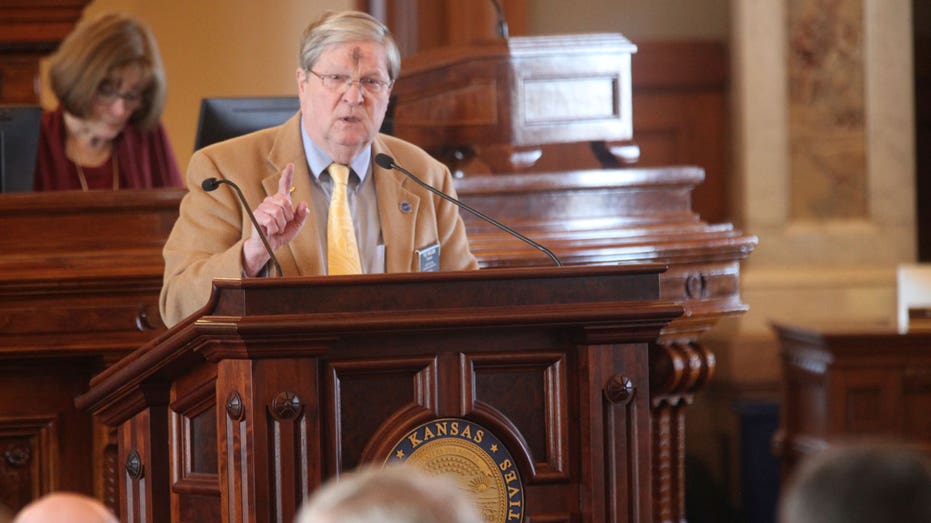Kansas’ GOP-controlled Legislature showed Thursday that it’s likely to pass a bill eliminating the three extra days state voters get to return mail-in ballots after an election, highlighting the influence election conspiracy theories still hold over Republicans’ thinking.
But the vote totals in the Kansas House and Senate strongly suggested conspiracy theory backers don’t have the clout to overcome Democratic Gov. Laura Kelly’s possible opposition. Each chamber approved its own, separate version of the bill but each fell short of the two-thirds majority needed to override any possible veto.
GOP lawmakers voted unanimously in 2017 to create the three-day grace period. That came amid concerns a restructuring of the U.S. Postal Service’s mail-sorting operations had slowed the delivery of ballots.
KANSAS REPUBLICANS PUSH FORWARD ON BALLOT HARVESTING CRACKDOWN
On Thursday, 34 of the 44 Republicans still serving in either the House or the Senate voted to eliminate the grace period, including House Speaker Dan Hawkins and Senate President Ty Masterson, both Wichita-area Republicans.
Even though Kansas election officials have reported no potential fraud involving the grace period, many Republicans argue that eliminating it will restore public confidence in the state’s elections. Baseless election conspiracies have floated widely within the GOP since 2020, with former President Donald Trump repeatedly making false claims about his loss.
“All you’ve got to do is read the papers and what you guys say,” Hawkins told reporters before the House vote. “I mean, people do question the fraud all the time. Is there fraud? I think actually we’re a fairly good state. But we can always make things better.”
The vote in the House was 77-45, and with two Republicans absent, supporters were at least six votes short of the 84 needed to override a veto in the 125-member chamber. In the 40-member Senate, the vote was 23-17, leaving the backers of its separate bill four votes short.
Either one chamber will have to pass the other’s bill to send it to Kelly, or the House and Senate will negotiate a version for both to approve. A version of the proposal is expected to clear the Legislature by early April.
Supporters of eliminating the grace period also suggested that Kansas is out of step with most other states. Thirty-one states require a mail ballot to arrive by Election Day to be counted, according to the National Conference of State Legislatures. Kansas, Massachusetts and Virginia have three-day grace periods.
“There’s nothing magical about it,” state Rep. Paul Waggoner, a Republican from south-central Kansas, said during a debate Wednesday.
While Kelly hasn’t said publicly that she would veto such a measure, her office said she is worried that the bill would prevent some voters serving in the military from having their ballots counted, disenfranchising them.
A few Republicans who want to keep the grace period in place made the same argument. Others, like many Democrats, contend that U.S. mail service has gotten only slower in the intervening six years.
WISCONSIN SUPREME COURT VOTES AGAINST ABSENTEE BALLOT DROP BOX
“We should always err on the side of the voter and do everything to accommodate and count legal ballots,” Republican state Rep. Jesse Borjon, of Topeka, said in a statement read by a House clerk. Borjon formerly worked in the Kansas secretary of state’s office.
Republicans also are split over whether the state should eliminate remote ballot drop boxes. The Senate approving a bill to do that Thursday on a 21-19 vote, while the House has a bill to keep them but allow Secretary of State Scott Schwab, a vocal promoter of drop boxes, to set standard rules for counties governing their use.
But one sign that election conspiracies still influence Republicans came earlier this month when the GOP state committee narrowly elected conspiracy promoter Mike Brown to serve as the party’s state chair through the 2024 elections. Brown also ran for secretary of state last year, losing the GOP primary to Schwab.
“This idea that people have lost confidence in elections is because we have a bunch of loonies running around,” House Democratic Leader Vic Miller, of Topeka, said during Wednesday’s debate. “Yes, if you repeat an incorrect statement often enough, unfortunately, some people begin to believe it.”
























